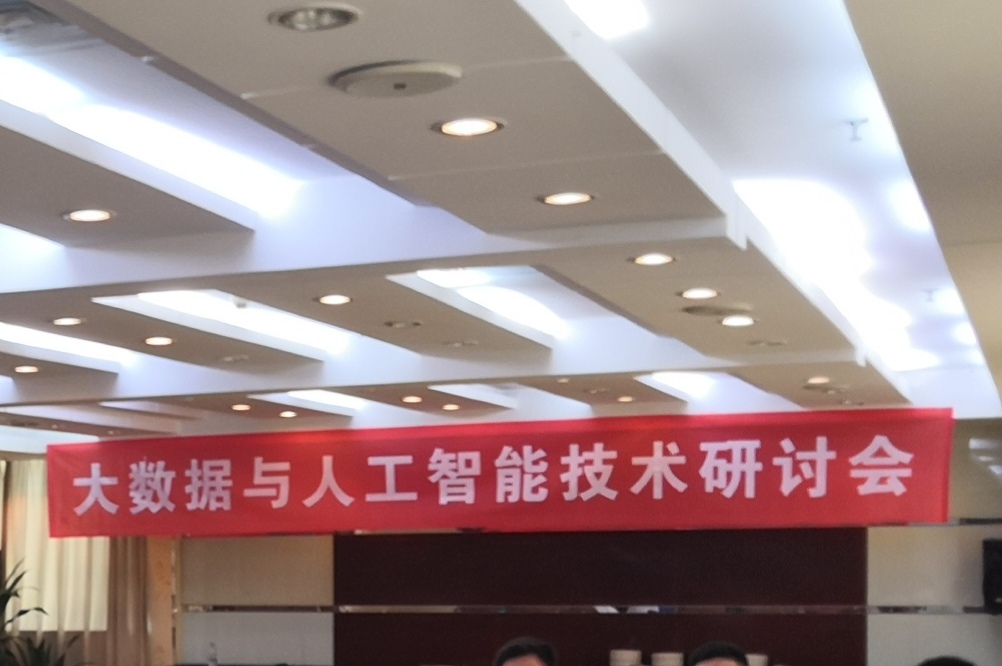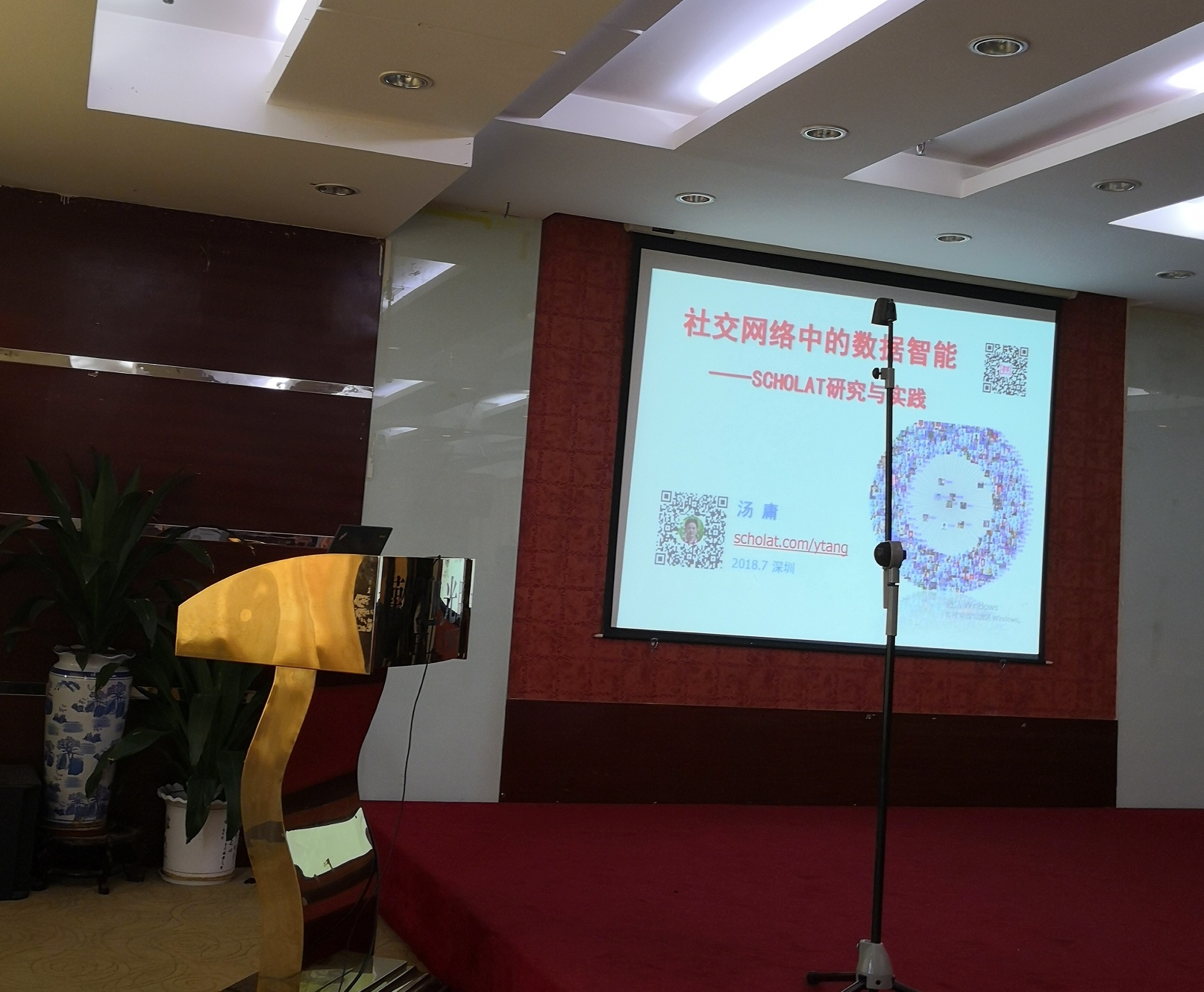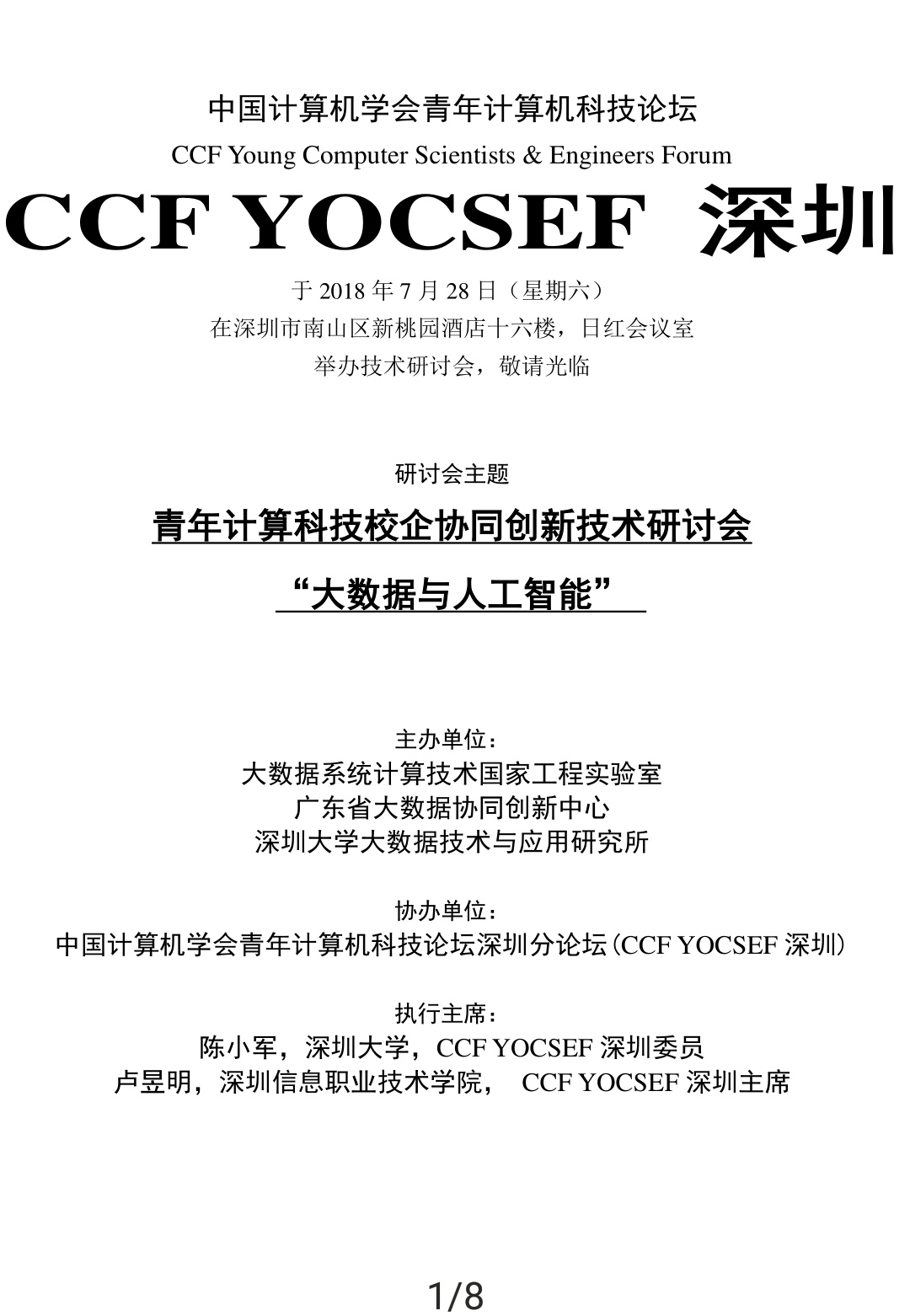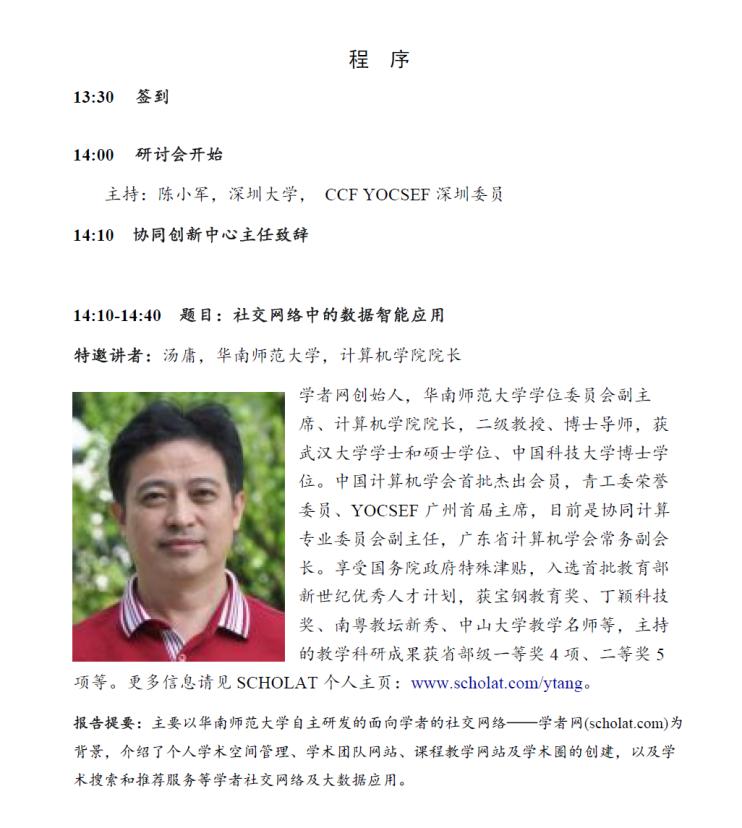2018年7月28日,,由深圳大學(xué)廣東省大數(shù)據(jù)協(xié)同創(chuàng)新中心,、深圳大學(xué)大數(shù)據(jù)系統(tǒng)計(jì)算技術(shù)國(guó)家工程實(shí)驗(yàn)室、CCF YOCSEF深圳等聯(lián)合舉辦了以“大數(shù)據(jù)與人工智能技術(shù)"為主題的“青年計(jì)算科技校企協(xié)同創(chuàng)新技術(shù)沙龍”,。 研討會(huì)邀請(qǐng)了來(lái)自華南師范大學(xué),、香港城市大學(xué)、香港大學(xué)、西北工業(yè)大學(xué)/深圳大學(xué),、騰訊公司等粵港澳三地的5位學(xué)者做特邀報(bào)告,。
學(xué)者網(wǎng)團(tuán)隊(duì)湯庸報(bào)告題目為"社交網(wǎng)絡(luò)中的數(shù)據(jù)智能應(yīng)用"。該報(bào)告主要介紹學(xué)者社交網(wǎng)絡(luò)SCHOLAT中大數(shù)據(jù)應(yīng)用案例及其數(shù)據(jù)智能研究情況,,得到學(xué)術(shù)界和工業(yè)界與會(huì)人員積極反響,。

“大數(shù)據(jù)與人工智能技術(shù)"沙龍會(huì)場(chǎng)



研討會(huì)海報(bào)(節(jié)選)
題目:社交網(wǎng)絡(luò)中的數(shù)據(jù)智能應(yīng)用
特邀講者:湯庸,華南師范大學(xué),,計(jì)算機(jī)學(xué)院院長(zhǎng)
學(xué)者網(wǎng)創(chuàng)始人,,華南師范大學(xué)學(xué)位委員會(huì)副主席、計(jì)算機(jī)學(xué)院院長(zhǎng),,二級(jí)教授,、博士導(dǎo)師,獲武漢大學(xué)學(xué)士和碩士學(xué)位,、中國(guó)科技大學(xué)博士學(xué)位。中國(guó)計(jì)算機(jī)學(xué)會(huì)首批杰出會(huì)員,,青工委榮譽(yù)委員,、YOCSEF廣州首屆主席,目前是協(xié)同計(jì)算專(zhuān)業(yè)委員會(huì)副主任,,廣東省計(jì)算機(jī)學(xué)會(huì)常務(wù)副會(huì)長(zhǎng),。享受?chē)?guó)務(wù)院政府特殊津貼,入選首批教育部新世紀(jì)優(yōu)秀人才計(jì)劃,,獲寶鋼教育獎(jiǎng),、丁穎科技獎(jiǎng)、南粵教壇新秀,、中山大學(xué)教學(xué)名師等,,主持的教學(xué)科研成果獲省部級(jí)一等獎(jiǎng)4項(xiàng)、二等獎(jiǎng)5項(xiàng)等,。更多信息請(qǐng)見(jiàn)SCHOLAT個(gè)人主頁(yè):htcdzsw999.com/ytang,。
報(bào)告提要:主要以華南師范大學(xué)自主研發(fā)的面向?qū)W者的社交網(wǎng)絡(luò)——學(xué)者網(wǎng)(scholat.com)為背景,介紹了個(gè)人學(xué)術(shù)空間管理,、學(xué)術(shù)團(tuán)隊(duì)網(wǎng)站,、課程教學(xué)網(wǎng)站及學(xué)術(shù)圈的創(chuàng)建,以及學(xué)術(shù)搜索和推薦服務(wù)等學(xué)者社交網(wǎng)絡(luò)及大數(shù)據(jù)應(yīng)用,。
題目:Event Cube: a Conceptual Framework for Multi-sourced Event Management and Multi-dimensional Analysis
特邀講者:李青,,香港城市大學(xué)電腦科學(xué)系,多媒體軟件工程研究中心創(chuàng)始主任
Qing Li is a Professor at the Department of Computer Science, and the Director of the Engineering Research Centre on Multimedia Software at the City University of Hong Kong, where he joined as a faculty member since Sept 1998. He received his B.Eng. from Hunan University (Changsha), and M.Sc. and Ph.D. degrees from the University of Southern California (Los Angeles), all in computer science. His research interests include multi-modal data management, conceptual data modeling, social media and Web services, and e-learning systems. He has authored/co-authored over 400 publications in these areas. He is actively involved in the research community and has served as an associate editor of a number of major technical journals including IEEE Transactions on Knowledge and Data Engineering (TKDE), ACM Transactions on Internet Technology (TOIT), Data and Knowledge Engineering (DKE), World Wide Web (WWW), and Journal of Web Engineering, in addition to being a Conference and Program Chair/Co-Chair of numerous major international conferences. He also sits in the Steering Committees of DASFAA, ER, ACM RecSys, IEEE U-MEDIA, and ICWL. Prof. Li is a Fellow of IET (UK), a senior member of IEEE (US) and a distinguished member of CCF (China).
報(bào)告提要: The publicly available data such as the massive and dynamically updated news and social media data streams (a.k.a. big data) covers the various aspects of social activities, personal views and Expressions, which points to the importance of understanding and discovering the
knowledge patterns underlying the big data, and the need of developing methodologies and techniques to discover real-world events from such big data, to manage and to analyze the discovered events in an efficient and elegant way. In this talk we introduce techniques of discovering events from the multi-modal big data and building an event cube model to support event queries and analysis, by addressing the tasks of data cleansing, data fusion, event detection and modeling. Preliminary experimental results on some of the tasks will be reported. We further explore and connect the important events discovered in a multimodal collection of inputs from various public sources, uncover their co-occurrence and track down the spatial and temporal dependency to answer the challenging questions of "how" and "why". A novel event cube (EC) model is devised to support various queries and analysis tasks of events; such events include those discovered by techniques of untargeted event detection (UED) and targeted event detection (TED) from multi-sourced data. More specifically, based on essential event elements of 5W1H, the EC model is developed to organize the discovered events from multiple dimensions, and to operate on the events at various levels of granularity, which facilitates analyzing and mining hidden/inherent relationships among the events effectively.
題目:Meta Paths and Meta Structures: Analysing Large Heterogeneous Information Networks
特邀講者:Reynold Cheng,,香港大學(xué),,計(jì)算機(jī)系副教授
Dr. Reynold Cheng obtained his MSc and PhD from Department of Computer Science of Purdue University in 2003 and 2005 respectively. He was an Assistant Professor in HKU since 2008-11. He was granted an Outstanding Young Researcher Award 2011-12 by HKU. He is the Chair of the Department Research Postgraduate Committee of HKU. He is an editorial board member of TKDE, DAPD and IS, and was a guest editor for TKDE, DAPD, and Geoinformatica. He is an area chair of ICDE 2017, a senior PC member for DASFAA 2015, PC
co-chair of APWeb 2015, area chair for CIKM 2014, area chair for Encyclopedia of Database Systems, program co-chair of SSTD 2013, and a workshop co-chair of ICDE 2014. He received an Outstanding Service Award in the CIKM 2009 conference.
報(bào)告提要: A heterogeneous information network (HIN) is a graph model in which objects and edges are annotated with types. Large and complex databases, such as YAGO and DBLP, can be modeled as HINs. A fundamental problem in HINs is the computation of closeness, or relevance, between two HIN objects. Relevance measures, such as PCRW, PathSim, and HeteSim, can be used in various applications, including information retrieval, entity resolution, and product recommendation. These metrics are based on the use of meta paths, essentially a sequence of node classes and edge types between two nodes in a HIN. In this tutorial, we will give a detailed review of meta paths, as well as how they are used to define relevance. In a large and complex HIN, retrieving meta paths manually can be complex, expensive, and error-prone. Hence, we will explore systematic methods for finding meta paths. In particular, we will study a solution based on the Query-by-Example (QBE) paradigm, which allows us to discovery meta paths in an effective and efficient manner.
We further generalise the notion of a meta path to "meta structure", which is a directed acyclic graph of object types with edge types connecting them. Meta structure, which is more expressive than the meta path, can describe complex relationship between two HIN objects (e.g., two papers in DBLP share the same authors and topics). We develop three relevance measures based on meta structure. Due to the computational complexity of these measures, we also study an algorithm with data structures proposed to support their evaluation. Finally, we will examine solutions for performing query recommendation based on meta paths. We will also discuss future research directions in HINs.
題目:大規(guī)模結(jié)構(gòu)化學(xué)習(xí)及其高效聚類(lèi)算法
特邀講者:聶飛平,西北工業(yè)大學(xué)教授,深圳大學(xué)兼職特聘教授,,青年**
聶飛平,,西北工業(yè)大學(xué)教授,深圳大學(xué)兼職特聘教授,,中組部青年****,。2008年至2009年曾在新加坡南洋理工大學(xué)從事研究工作,之后在美國(guó)德州大學(xué)阿靈頓分校先后擔(dān)任研究助理教授,,研究副教授,,研究教授,2015年入選中組部青年****,。主要研究興趣為模式識(shí)別與機(jī)器學(xué)習(xí)中的理論和方法設(shè)計(jì),,并將所設(shè)計(jì)的方法成功應(yīng)用于圖像分割與標(biāo)注、多媒體信息理解與檢索,、生物信息學(xué)等領(lǐng)域的實(shí)際問(wèn)題中,。已在TPAMI、IJCV,、TNNLS,、ICML、NIPS,、SIGKDD等國(guó)際頂尖期刊和會(huì)議上發(fā)表學(xué)術(shù)論文百余篇,,其中在中國(guó)計(jì)算機(jī)學(xué)會(huì)(CCF)推薦的A類(lèi)期刊和會(huì)議上發(fā)表論文100余篇。據(jù)Google Scholar統(tǒng)計(jì),,論文總引用為10000余次,,H指數(shù)為52。常年應(yīng)邀擔(dān)任相關(guān)領(lǐng)域頂級(jí)期刊和會(huì)議的審稿專(zhuān)家或程序委員會(huì)委員,,并同時(shí)應(yīng)邀擔(dān)任IEEE Transactions on Neural Networks and Learning Systems,、Information Science等多個(gè)國(guó)際一流SCI期刊的編委。
報(bào)告提要:數(shù)據(jù)聚類(lèi)是機(jī)器學(xué)習(xí)和數(shù)據(jù)挖掘研究中的一個(gè)基本問(wèn)題,。在數(shù)十年的研究中,,已經(jīng)提出了很多聚類(lèi)方法,而基于圖的聚類(lèi)方法是其中最有效的方法之一,。傳統(tǒng)的圖聚類(lèi)方法需要用戶事先給定一個(gè)圖,,然后采用松弛技巧將問(wèn)題轉(zhuǎn)化為一個(gè)可解的問(wèn)題。由于一般的圖不具有結(jié)構(gòu)性,,因此得到的解是連續(xù)的,,需要利用離散技術(shù)得到最終的聚類(lèi)結(jié)果,從而使得聚類(lèi)結(jié)果十分依賴于初始化,。針對(duì)這些問(wèn)題,,我們提出了一種結(jié)構(gòu)化圖學(xué)習(xí)方法,,通過(guò)學(xué)習(xí)一個(gè)具有結(jié)構(gòu)的圖,使得我們可以直接得到聚類(lèi)結(jié)果,,不再依賴于初始化,。該新方法具有性能優(yōu)越,穩(wěn)定等優(yōu)點(diǎn),,并且其中的結(jié)構(gòu)化圖學(xué)習(xí)思想可以應(yīng)用在其他基于圖的機(jī)器學(xué)習(xí)方法中,,具有很大的應(yīng)用價(jià)值和啟發(fā)性。
題目:騰訊知識(shí)圖譜的AI應(yīng)用
特邀講者:成杰峰,,騰訊專(zhuān)家級(jí)研究員,,騰訊AI安全負(fù)責(zé)人
成杰峰,香港中文大學(xué)博士,,香港大學(xué)博士后,。曾任中國(guó)科學(xué)院副教授,華為諾亞方舟實(shí)驗(yàn)室(香港)研究員,,現(xiàn)任職騰訊專(zhuān)家研究員,、騰訊AI安全負(fù)責(zé)人。研發(fā)了一系列分析大規(guī)模巨型圖的核心技術(shù),。負(fù)責(zé)研發(fā)了華為VENUS圖計(jì)算系統(tǒng),、騰訊安全AI引擎、騰訊云星圖知識(shí)圖譜的研發(fā),。曾主持過(guò)包括國(guó)家自然科學(xué)基金項(xiàng)目、廣東省科技重大專(zhuān)項(xiàng)等多項(xiàng)國(guó)家,、省重點(diǎn)項(xiàng)目,;在TKDE、JVLDB,、VLDB,、ICDE、KDD,、CIKM等國(guó)際頂刊/會(huì)上發(fā)表40余篇學(xué)術(shù)論文,,累計(jì)引用千余次,產(chǎn)生了20余項(xiàng)國(guó)內(nèi)國(guó)際專(zhuān)利,。
報(bào)告提要:將介紹騰訊云星圖知識(shí)圖譜在AI方面的一些應(yīng)用,。